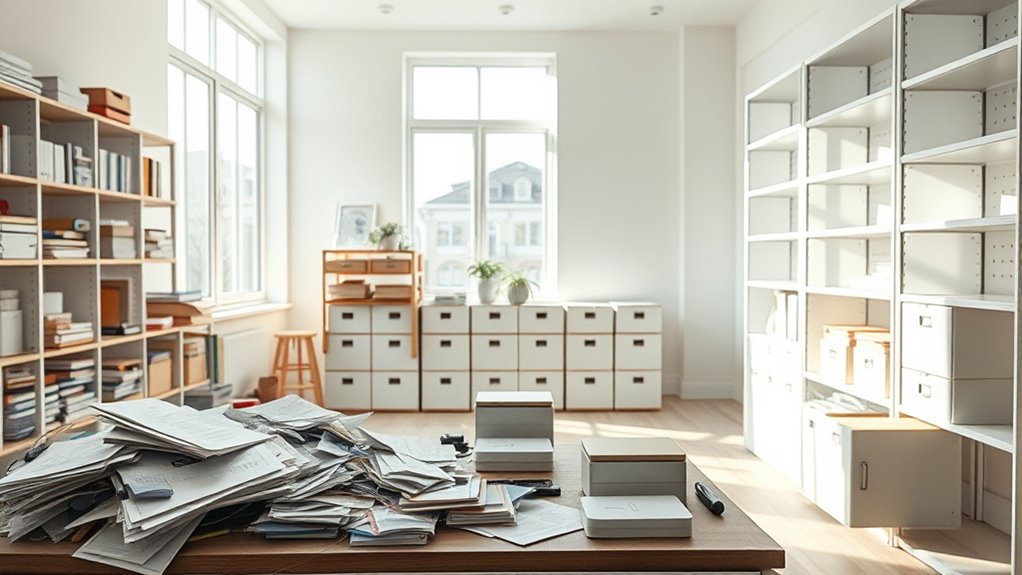Many myths about decluttering can hold you back, like believing you must get rid of everything or that it’s only for perfectionists. In reality, decluttering is about making intentional choices that fit your lifestyle, and it’s a gradual process, not a one-time event. Small steps can lead to big changes, and it’s more about creating space for what truly matters. Keep exploring to discover how busting these myths can transform your approach.
Key Takeaways
- Decluttering isn’t about getting rid of everything; it’s about making intentional, mindful choices.
- You don’t need to overhaul your entire space at once; small, gradual steps are effective.
- Decluttering is a personalized process that suits individual routines and emotional needs.
- It can be an empowering self-care activity, not just a tedious chore.
- Emotional attachment to items shouldn’t prevent space creation; photos or keepsake boxes can preserve memories efficiently.

Have you ever wondered if decluttering is really worth the effort? Many people hesitate because they believe it’s an overwhelming task or that they’ll regret letting go of certain belongings. However, adopting a minimalist mindset can make the process more manageable and even enjoyable. A minimalist mindset isn’t about deprivation; it’s about intentionally choosing what adds value to your life. When you shift your perspective this way, decluttering becomes less about discarding and more about creating space for what truly matters. Still, one of the biggest hurdles is emotional attachment. It’s perfectly normal to feel sentimental about certain items—perhaps a childhood toy or a gift from a loved one. These emotional attachments can make it difficult to part with possessions, even when they no longer serve a purpose. But understanding that your emotional well-being isn’t tied to clutter can help you move forward. You don’t need to keep everything to preserve memories; instead, you can take photos or create keepsake boxes that hold only the most meaningful items. This approach allows you to honor your feelings without sacrificing space or peace of mind. Additionally, understanding how home theatre projectors work can inspire you to create a dedicated space for relaxation and entertainment, making it easier to enjoy your decluttered environment. Many believe that decluttering is a one-time event or something reserved for people with lots of time and energy. In reality, it’s a gradual process that fits into your lifestyle. Even dedicating just a few minutes a day can lead to significant progress. The idea is to build a decluttering routine that aligns with your routines and preferences, rather than trying to overhaul everything at once. By doing so, you reduce the emotional stress often associated with letting go of possessions. It’s also a myth that decluttering means you have to get rid of everything. Instead, it’s about making conscious choices about what to keep, what to donate, and what to discard. This mindset shift helps you see decluttering as a form of self-care and empowerment, rather than a formidable chore.
Frequently Asked Questions
How Often Should I Declutter My Entire Home?
You should declutter your entire home every 3 to 6 months to keep clutter hotspots under control. Regular decluttering helps you discover better storage solutions and prevents clutter from building up. Focus on areas like your closet, kitchen, and garage, which tend to become clutter hotspots. Setting a schedule makes the process manageable, ensuring your space stays organized and functional, and you can easily maintain a tidy, stress-free home.
Does Decluttering Improve Mental Health Significantly?
Think of decluttering as clearing a foggy window — it instantly refreshes your view. Yes, decluttering can markedly boost your mental health by improving emotional well-being and reducing stress. When you remove clutter, you create a more organized space that fosters calm and focus. This simple act helps you feel more in control and less overwhelmed, making it easier to enjoy your surroundings and maintain a healthier, happier mindset.
Can Decluttering Reduce Allergy Symptoms?
Yes, decluttering can reduce allergy symptoms by minimizing airborne allergens and dust accumulation. When you clear clutter, you eliminate hiding spots for dust mites and mold, making it easier to keep surfaces clean. Regularly dusting and vacuuming becomes more effective, reducing airborne allergens that trigger allergies. So, by decluttering your space, you create a healthier environment that can lessen allergy symptoms and improve your overall comfort.
Is There an Ideal Method for Decluttering Quickly?
You wonder if there’s an ideal method for decluttering quickly. Focus on effective storage solutions to organize items efficiently, and practice good time management by setting specific goals and time blocks for each area. Start with small spaces to build momentum, sorting items into keep, donate, or discard piles. Prioritize tasks, stay consistent, and avoid overthinking. This approach helps you declutter faster and maintains a tidy space longer.
What Are the Best Ways to Motivate Myself to Declutter?
To motivate yourself to declutter, start by setting small, achievable goals and celebrating each success. Use motivational quotes to inspire you and keep your spirits high. Implement reward systems—like treating yourself after completing a task—to stay committed. Remember, breaking the process into manageable steps makes it less overwhelming. With consistent effort and positive reinforcement, you’ll find decluttering becomes easier and even enjoyable over time.
Conclusion
Now that you’ve uncovered the truth behind these decluttering myths, you’re closer than ever to transforming your space. But remember, the real challenge isn’t just letting go—it’s understanding what truly matters. As you venture further, unexpected obstacles might appear, testing your resolve. Will you stick to the facts or fall back into old habits? The next step is yours. Are you ready to face what lies ahead and open a clutter-free life?









